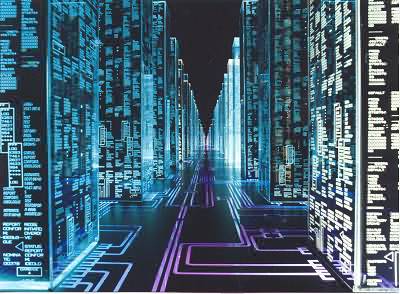In the past I have been anything but an apoligist for the tech world's advancements. I crave some of the visions of the future that I grew up with in sci-fi films and televisions. From a teleporter to a self-drive aircar. From a replicator or holodeck to an omnipresent mainframe that serves the needs of humanity... of course somehow these scenarios inevitably turn out bad.
The backbone for all such technology demands an immense mainframe that contains, if not the total, at least a large chunk of academic, social and personal information to dole out upon request. And while I know that, in most dystopian film plots, the archetypal consequence for individuals giving up their knowledge often ends badly, there is a lingering attraction to a tool that at command, whim and request can produce information and content that is uniquely customized to a user within a specific environment.
The first step to such a system has its nascent development in cloud computing, and while part of me is ready to release my kite into the cummulus, another part of me is remembering Twitter's Fail Whale and 404 errors of days gone by.
There is inherent risk that's greater than someone hacking Amazon to steal credit card information or a government website to lift social security numbers. Cloud computing demands that beyond the day to day information necessary to run our lives, we also commit our memory - i.e. writing, pictures, music and emails. And while many of us have copies of pictures in Flickr and stream music from last.fm, are we ready to commit the sole copies of such things to the cloud?
Being a victim of credit card fraud can range from annoying to devastating, but imagine a future where a system crash wipes out the only existing images of deceased loved ones or a child's first birthday. When do we reach that level of trust, not with certain things, but with EVERYTHING? For the skynet to work its magic, and be all it can be, it needs such information. Google, and other Web 2.0 in-browser software, would have us move all of our documents and spreadsheets into the cloud. Through blogs, many people have given up their creativity to the cloud... after all, how many of us keep backups of everything we post? Flickr has, what I'm sure, are the sole copies of at least some visual records of people and places and events. The news is moving from paper to html to rss to xml and soon hard copies will be a thing of the past.
Make no mistake. The sky is getting bigger. The clouds are growing in size and getting more numerous. The sun, however, is becoming infrequent and I can feel a storm coming on. I don't know when the first PCs and Macs will ship without hard drives, but I think we're within ten years. I don't know how soon after that a lightning strike will erase all visual records of someone's Uncle Owen or Aunt Beru, but I'm thinking we're within eleven years. I don't know when all high speed networking will be wireless and paid for through taxes, but I can see it through the rain.
I do know this. When I have to suffer a blackout, I feel, sadly, lost without a TV or my computer. My content has disappeared and now I have to spend time reading books, which, in a cloud world, will soon not exist off of my computer... well, at least I'll be okay until the batteries on my Kindle 2010 run out and my iPod nano version 10 (which has been broken to countersink into my forearm and run off of bio-electical energy) shorts out my nervous system. I suppose I can pick up a piece of charcoal from the barbeque and scratch some renderings of the circling wildlife that's coming back to claim a world where all knowledge has been shorted out by a failed surge protector.
While I love the concept of cloud computing, it's going to take a lot of convincing to get me to let go of the kite string that keeps my information grounded.





